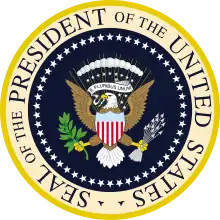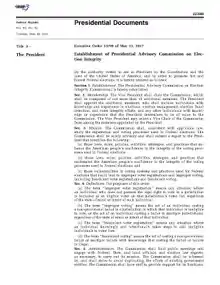Executive Order 13799
Executive Order 13799 (E.O. 13799, 82 FR 22389), titled Establishment of Presidential Advisory Commission on Election Integrity, is an executive order signed by U.S. President Donald Trump on May 11, 2017.[1][2] The Trump administration has said the Presidential Advisory Commission on Election Integrity (PEIC) would review claims of voter fraud, improper registration, and voter suppression.[3] Critics and civil rights groups have argued that such claims are unfounded and that the intent of the order is to enable the suppression of voting rights.[4]
| Establishment of the Presidential Advisory Commission on Election Integrity | |
 | |
 | |
| Type | Executive order |
|---|---|
| Executive Order number | 13799 |
| Signed by | Donald Trump on May 11, 2017 |
| Federal Register details | |
| Federal Register document number | 2017-10003 |
| Publication date | May 16, 2017 |
| Document citation | 22389 |
| Summary | |
| Establishes the Presidential Advisory Commission on Election Integrity | |
The order was subsequently revoked by Executive Order 13820 (titled "Termination of Presidential Advisory Commission on Election Integrity"), which was signed by President Trump on January 3, 2018.[5]
Background
During his campaign for President, Donald Trump made numerous claims of large-scale voter fraud occurring in the United States which have been criticized as lacking evidence by commentators including FactCheck.org.[6][7] In the run-up to the election, Trump also asked his supporters to volunteer as "poll watchers" on Election Day, leading to fears from some of voter intimidation.[8][9]
On November 8, 2016, Donald Trump won the 2016 United States presidential election electoral college vote 304 to 227, although his opponent, Hillary Clinton, had received 2.9 million more votes.[4] After his victory, Trump claimed on Twitter that "In addition to winning the Electoral College in a landslide, I won the popular vote if you deduct the millions of people who voted illegally."[10] In an interview with Dan Muir just after his inauguration he repeated his belief that registration issues could total millions, referring to a Pew Report, and the intent to do an investigation.[11] A few days later he vowed in Twitter to open an inquiry. “I will be asking for a major investigation into VOTER FRAUD, including those registered to vote in two states, those who are illegal and even, those registered to vote who are dead (and many for a long time). Depending on results, we will strengthen up voting procedures!”.[12] It was mentioned after his inauguration in January 2017 that this would be by Executive Order.[13][14]
Membership
The Vice President shall chair the Commission, which shall be composed of not more than 15 additional members. The President shall appoint the additional members, who shall include individuals with knowledge and experience in elections, election management, election fraud detection, and voter integrity efforts, and any other individuals with knowledge or experience that the President determines to be of value to the Commission. The Vice President may select a Vice Chair of the Commission from among the members appointed by the President.[1][2][4]
Provisions
- (a) To the extent permitted by law, and subject to the availability of appropriations, the General Services Administration shall provide the Commission with such administrative services, funds, facilities, staff, equipment, and other support services as may be necessary to carry out its mission on a reimbursable basis.
- (b) Relevant executive departments and agencies shall endeavor to cooperate with the Commission.
- (c) Insofar as the Federal Advisory Committee Act (FACA), as amended (5 U.S.C. App.) (the "Act"), may apply to the Commission, any functions of the President under that Act, except for those in section 6 of the Act, shall be performed by the Administrator of General Services.
- (d) Members of the Commission shall serve without any additional compensation for their work on the Commission, but shall be allowed travel expenses, including per diem in lieu of subsistence, to the extent permitted by law for persons serving intermittently in the Government service (5 U.S.C. 5701–5707).
- (e) Nothing in this order shall be construed to impair or otherwise affect:
- (i) the authority granted by law to an executive department or agency, or the head thereof; or
- (ii) the functions of the Director of the Office of Management and Budget relating to budgetary, administrative, or legislative proposals.
- (f) This order shall be implemented consistent with applicable law and subject to the availability of appropriations.
- (g) This order is not intended to, and does not, create any right or benefit, substantive or procedural, enforceable at law or in equity by any party against the United States, its departments, agencies, or entities, its officers, employees, or agents, or any other person.[1][2]
Reactions
H.R. 3029 titled Combating the President’s Voter Suppression Commission Act was introduced by Representative Marc Veasey (D) Texas 33rd congressional district on June 22, 2017. It would prevent Federal funds from being used to carry out Executive Order 13799.[15] H.R. 3214 titled Anti-Voter Suppression Act was introduced by Representative Cedric Richmond (D) Louisiana's 2nd congressional district on July 12, 2017. It would nullify the effect of the Executive order that establishes the committee.[16]
The legislative initiatives are in early stages and are estimated by GovTrack at less than one percent chance of success.[17]
See also
- Election Assistance Commission
- List of executive actions by Donald Trump
- National Voter Registration Act of 1993, also known as the Motor Voter Act, requiring state governments to offer voter registration
- True the Vote, a conservative vote-monitoring organization
References
- Office of the Press Secretary (May 11, 2017). "Presidential Executive Order on the Establishment of Presidential Advisory Commission on Election Integrity". whitehouse.gov. Washington, D.C.: White House. Retrieved July 23, 2017.
 This article incorporates text from this source, which is in the public domain.
This article incorporates text from this source, which is in the public domain. - "Establishment of Presidential Advisory Commission on Election Integrity". Federal Register. Washington, D.C.: National Archives and Records Administration. May 11, 2017. Archived from the original on July 17, 2017. Retrieved May 16, 2017. Alt URL
 This article incorporates text from this source, which is in the public domain.
This article incorporates text from this source, which is in the public domain. - Lowry, Bryan; Wise, Lindsay (May 11, 2017). "Civil rights groups fume about Trump's choice of Kris Kobach for voter fraud panel". The Kansas City Star. Kansas City, Missouri: The McClatchy Company. Retrieved July 23, 2017.
- Henderson, Barney (May 11, 2017). "Donald Trump signs executive order to establish voter fraud investigation". The Daily Telegraph. London: Telegraph Media Group. Retrieved July 23, 2017.
- "Executive Order on the Termination of Presidential Advisory Commission on Election Integrity". The White House. Retrieved June 3, 2018.
- Farley, Robert (January 25, 2017). "Trump's Bogus Voter Fraud Claims Revisited". FactCheck.org. Retrieved June 9, 2018.
- "More Trump Deception on Voter Fraud - FactCheck.org". FactCheck.org. January 26, 2017. Retrieved November 2, 2017.
- Gabriel, Trip (October 18, 2016). "Donald Trump's Call to Monitor Polls Raises Fears of Intimidation". The New York Times. New York City: The New York Times Company. Retrieved July 23, 2017.
- Gambino, Lauren (October 20, 2016). "Who's watching the poll watchers: what to expect on general election day". The Guardian. Kings Place, London: Guardian Media Group. Retrieved July 23, 2017.
- Trump, Donald [@realDonaldTrump] (November 27, 2016). "In addition to winning the Electoral College in a landslide, I won the popular vote if you deduct the millions of people who voted illegally" (Tweet). Retrieved July 23, 2017 – via Twitter.
- "TRANSCRIPT: ABC News anchor David Muir interviews President Trump". January 25, 2017. Retrieved July 23, 2017.
- Bouie, Jamelle (May 11, 2017). "The Presidential Advisory Commission on Voter Suppression". Slate. United States: The Slate Group. Retrieved July 23, 2017.
- "Trump talks executive orders, agenda at GOP retreat in Philadelphia". Retrieved August 5, 2017.
- "Trump to sign executive action on voter fraud". Retrieved August 5, 2017.
- Veasey, Marc (June 22, 2017). "H.R. 3029". United States Congress. Washington, D.C.: Government Printing Office. Retrieved July 23, 2017.
- Richmond, Cedric (July 12, 2017). "H. R. 3214". United States Congress. Washington, D.C.: Government Printing Office. Retrieved July 23, 2017.
- "Search "executive order 13799"". GovTrack. Washington, D.C.: Civic Impulse, LLC. Retrieved July 23, 2017.
